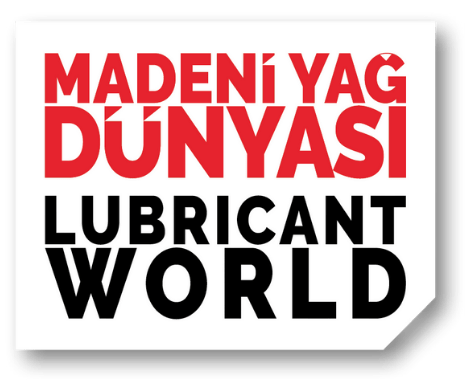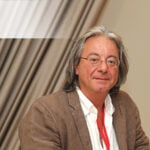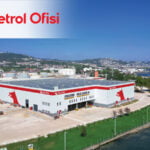This year, we celebrate the 250th anniversary of Istanbul Technical University along with the 100th anniversary of Turkish Republic. Founded in 1773 as Imperial School of Naval Engineering (Ottoman Turkish: Mühendishâne-i Bahrî-i Hümâyun), Istanbul Technical University played an important role in the development of Türkiye as one of the educational institutions inherited from the Ottoman Empire to the Turkish Republic. With its scientific research, academic publications, innovative projects and qualified education, the institution became a symbol of a worker bee for the Turkish Republic, contributing to reaching the level of contemporary civilizations that Atatürk set as a goal.
One of the those worker bees of Istanbul Technical University is without doubt Prof. Dr. Filiz Karaosmanoğlu. Celebrating her 40th year work anniversary this year, Prof. Dr. Karaosmanoğlu proudly represents Turkish Republic as a female scholar in the list of the world’s most science-wide authors. Prof. Dr. Filiz Karaosmanoğlu, who is one of the respected names shaping the chemical industry with her research, publications, projects, civil society activities and the students she has trained, is also among the opinion leaders of the lubricants industry.
We had an insightful conversation with Prof. Dr. Filiz Karaosmanoğlu, who has been the Chairwoman of the Editorial Board of our magazine since the start of publication in 2016 and who sheds light on our industry with her regular columns on “Sustainability, Environment and Biolubricants”. We talked about the chemical industry, the lubricant sector and its transition to circular economy and, most importantly, “the future” awaiting us in the 100th anniversary of Turkish Republic and the 250th anniversary of ITU.
Prof. Dr. Filiz Karaosmanoğlu, a flag-bearer of Türkiye’s sustainable development journey, introduced many concepts related to the subject to the literature and has been working hard to raise interest and awareness in the civil society as the President of Sustainable Production and Consumption Association (SÜT-D), holds up the Nazilli Basma Factory founded by Atatürk as an example in achieving the UN’s Sustainable Development Goals.
As an experienced scholar who greatly contributed to the Turkish Republic and ITU, how would you describe the 100-year journey of the Republic and ITU’s role in this journey?
How fortunate I am to begin the new academic term with these numbers. Since 1773 till today and especially in the early years of the Turkish Republic, ITU has been involved in the industrial development and the construction of our country’s roads, dams, buildings, factories, and all its infrastructure. As engineers, we create, we build, we produce and we innovate. My university is my family in every respect. My husband is my best classmate. My son’s first and last graduation are from ITU. I go to my university eagerly without ever looking back.
This year is important for me in two more respects. The Sustainable Production and Consumption Association (SÜT-D), of which I am the President, celebrates its 10th year. Having an influential voice in the civil society is important to me. We also celebrate the 50th anniversary of ITU Alumni Turkish Music Society (İTÜMTMT). Music is like mathematics. Melodies are powerful molecules hanging in the air. Engineering is hidden in music. Being İTÜMTMT member is my honor. Briefly, it is beyond wonderful to witness the 250th anniversary of ITU, the technical power of Turkish Republic for 100 years, and to be an ITU graduate.
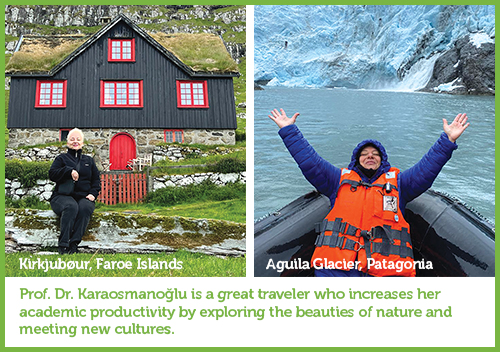
How would you evaluate the point that chemical engineering and the industry have reached in the 100th anniversary of Turkish Republic?
Our chemical industry is the shining star of our exports. It is our pride. I closely monitor our sector through my R&D role at the Istanbul Chemicals and Chemical Products Exporters’ Association (İKMİB). Access to fresh field data strengthens my academic research. In our sector, which provides products and intermediate inputs to 27 industries, higher value-added production is essential. Our sector closely follows global developments, especially those within the European Union (EU). In production planning, I expect us not to overlook products like coal chemicals and fertilizers, and to stay in line with circular economy and biorefinery advancements. R&D, innovation and university-industry collaboration are always on the agenda. However, our success in transitioning from the laboratory to the market is relatively small compared to the size of our sector.
As it is known, our industry and exporters have the European Green Deal and its accompanying strategies and action plans. Carbon Border Adjustment Mechanism (CBAM) and carbon pricing have emerged with their indisputable final status. Our sector is advancing in accordance with Sustainability Action Plan of the Türkiye Exporters Assembly (TİM) dated June 2021, as well as the plans of its associations. The bottom line is for each of our organizations to make sustainability management a fundamental element of their corporate culture. Sustainable production and consumption are essential. Improving environmental, social, and governance indicators and achieving through the Life Cycle Assessment (LCA) the reduction of all environmental impacts, particularly carbon and water footprints, of chemicals and final products reaching the consumer is significant as we progress toward a low-carbon economy. Green passport is essential. We need to work hard. Very hard. Because the products of the chemical industry are everywhere in our lives.
Chemical engineers are also everywhere where there is production. Our human resources are strong. In our industry, we have competent white-collar engineers and also an increasing number of green-collar chemical engineers. Our shortfall, like in many other sectors, is in blue-collar employment. We need swift action on this matter. We, as the Department of Chemical Engineering at ITU, are the top-ranked department in Türkiye in the QS World University Rankings by Subject. I always say that our alumni are our pride. Adil Pelister, the Chairman of the Board of Directors of İKMİB and Haluk Erceber, Chairman of the Board of Directors of Turkish Chemical Manufacturers’ Association, are both alumni of our department. Our alumni include many top-level executives and companies. I extend my sincere greetings to all our alumni.
We know that you focus on the lubricants, train many qualified people in this field and conduct research that guides the key players in the sector. Could you tell us about the process that drew your interest to the lubricants industry?
I conducted research on internal combustion engines using biofuels for my master’s and doctoral thesis, and my post-doctoral research. After completing my doctorate, I focused on lubricating oils and biomass energy technology. My area of expertise as an associate professor is energy technology. For chemical engineers, hydrocarbons are both raw materials and an energy source. Biorefineries cannot be understood well without a good knowledge of coal, petroleum, and natural gas. For the past 20 years, I have been working towards a greener and bluer planet by advocating that production can be made cleaner and the environmental impacts of production can be reduced. I am advancing in the fields of facility eco-design and LCA studies, which are my two main areas of expertise.
If you are taking care of engines, lubrication is essential in manufacturing. Lubricating oils and greases are important products of our industry. I have worked on lubrication topics, including lubricants, additives, biolubricating oils and waste oil management. I have educated thesis students. This subject has always been of great technical interest to me. Knowing the chemistry of lubricating oil and waste oil is a privilege. I have also had responsibilities related to relevant regulations. I can provide two examples of my projects for industrial footprint. I worked on the TAYRAŞ Upcycling Refinery investment, which I have been following since the idea stage, from February 2020 to April 2023 as a part of my project at İTÜNOVA Technology Transfer Office. I never forget that first day when I looked at our country’s first and only refinery in operation, shining brightly at night. The term “upcycling” in their name was my contribution. I am very pleased and happy. I extend my greetings to all those who have contributed to this investment, with special regards to Mehmet Afşin, the Chairman of Board of Directors and CEO of TAYRAŞ.
In our ITU-Cargill Türkiye project titled “Sustainable Production and Bioindustrial Product Development” FR3 Vegetable based Transformer Oil is one of our bio-products. Compared to fossil-based transformer oils, FR3 Vegetable based Transformer Oil is the most suitable and lowest carbon footprint technical choice for transformer building management and electricity supply sustainability management, thanks to its superior performance, environmentally friendly qualities and cost-saving advantages, especially reducing fire risks. We are working. Greetings to Cargill Orhangazi and Dilovası plants.
How would you describe the position and importance of the lubricant sector within the chemical industry?
The chemical industry not only produces lubricating oils, greases, additives and packaging, but also consumes lubricants and develops new products. The chemical industry is responsible for improving lubrication properties, extending lubricant shelf life, recycling/upcycling of used oil, and eco-designing the transportation and storage of lubricants. The chemical sector in Türkiye is a strong industry, successful in exports with both global brands and domestic manufacturers. Competition is a significant driver of success in the market. We also have strong sectoral associations. I foresee that the sector will make green initiatives in the production and supply of sustainable lubricants in the near future. It definitely should.
You are one of the pioneers of sustainability and circular economy in Türkiye. Could you share with us your vision on this matter?
The developments in EU and the United Nations (UN) highlight the necessity of sustainable management of daily and industrial life. As 17 Sustainable Development Goals (SDGs) tread our path, we move towards 2030 by assuring to eradicate extreme poverty, combat inequality and injustice, and climate change.
We have three urgent issues: environmental pollution, climate change and biodiversity loss. The industry has a trinity for three promises and challenges: Green, Circular and Digital Transformation. The Green, Circular and Digital Economy is developing together with this transformation. This is a challenging journey. We cannot ignore it. We need to start. We are about to lose our planet. Our success rate is low. SDG 12 assigns the task of responsible production and consumption primarily to citizens and especially engineers. Sustainability management is embedded in the engineering oath and engineering ethics. Sustainable production involves achieving the best waste-energy-water management and resource efficiency using the cleanest available technology.
As a citizen, academician, SÜT-D President and columnist, I dedicated myself to the green path and sustainable life. In all my efforts and in my columns, I prioritize providing accurate technical knowledge in Turkish to create added value. Selçuk Akat, the General Manager of ADCO, of whose success in the petroleum sector I am sure about, first shared with me the idea of creating the Lubricant World Magazine. The excitement we felt is still as fresh as yesterday. The magazine is achieving an important first and a unique mission. The title of my column is “Sustainability, Environment and Biolubricants.” This naming summarizes the essential direction of the industry in sustainability management, the need for transformation, and the path toward decarbonization.
In the 100th year of Turkish Republic, the point reached by our industry and significant achievements in exports are crucial. The only exception is the Industrial Revolution, which we missed. Hereke Silk and Wool Weaving, Bakırköy Cotton Weaving, Feshane Wool Weaving, Beykoz Leather and Shoe factories are the only manufactures remained from the Ottoman Empire. We also had ITU. The momentum gained by the young Republic is incredible. Our graduates greatly contributed to this momentum by taking on important responsibilities. You should visit the ITU Museum and watch the upcoming ITU 250th Year Documentary Series. We can better and more accurately evaluate the industrialization of the 100-year Turkish Republic by learning about the history of ITU.
In the week of innovation and entrepreneurship of my Chemical Technologies class, I usually emphasize the well-known words of Mustafa Kemal Atatürk: “Indus“Industrializatrialization is among our grtion is among our greaeattesest nat national goals.tional goals. WWe will ese will establish and opertablish and operaatte all kinds oe all kinds of indusf industries,tries, both larboth large and small, using the ecge and small, using the economic ronomic resouresourcceses aavvailable in our cailable in our country ensuring their operountry ensuring their operaation andtion and persispersisttencencee. It is a nec. It is a necesessitysity, firs, first and ft and fororemosemost ft foror the defthe defense oense of the homeland, as wf the homeland, as well as tell as to enhanco enhancee the vthe value oalue of our prf our products and toducts and to ro reach the ideal oeach the ideal off the mosthe most advt advancanced and pred and prosperosperous Tous Türkiyürkiye in thee in the shortshortesest post possible wsible waay” and his fy” and his famous saamous saying “Eying “Evveryery ffactactory is a casory is a castletle..”” I want to drew your attention to this. This necessity is also present in our current goals, commitments, strategies and action plans.
To produce and doing it sustainably is essential. At those earlier times, the words innovation and entrepreneurship did not exist. The state’s entrepreneurship and investments steamed up our industry. I invite our readers to get to know about the Nazilli Textile Factory, a great example of the Atatürk Type Factory and the Social Factory Model. You will find there UN SDGs and the sustainable life culture, which we aim to reach in today’s world. Actually, our culture, from Central Asia to Anatolia and Rumelia, is essentially a culture of sustainable living. However, we have lost our values. Sustainable development requires acceleration at home, in school, at work, on the roads, in the fields and in the forests. How beautiful is our country’s, our planet’s green and blue. We must appreciate its value. We should not disregard the value of life outside of ourselves – the living beings, plants, animals and microorganisms.
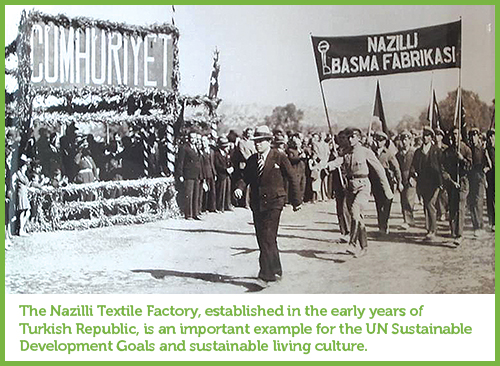
Compared to the world, where does the lubricant sector stand in terms of the circular economy?
In the chemical and lubricant sectors and the industry in general, the circular economy is implemented to a very limited extend, despite the existing installed capacity and waste potential. The positive impacts of circular economy on production are not fully known. There is a growing interest in organizations that establish connections between legislation, market demand and exports, driven by the necessity to respond to regulations.
Circular economy, briefly defined as minimizing waste generation, preserving the economic value of resources, products and materials for as long as possible, encompasses input-energy-water efficiency, best practices in waste management, recycling/upcycling and eco-design. Circular economy, which also focuses on creating value from underutilized or non-functional products, equipment, infrastructure and buildings through innovative business models, offers opportunities and green deals for lubricant producers, new investors entering the waste oil sector and packaging manufacturers. There is green money. This green is more valuable than dollar’s green.
It is possible to produce lubricating oil, grease and packaging while minimizing their environmental impacts throughout their lifecycle, almost as if the inputs are never truly consumed, thereby adding value to the economy. Our legislations are ready. The number of technically competent and adequate facilities for processing waste oil is very limited. The proportion of recycled plastic in packaging should also be increased. As investments increase, waste oil should be incorporated into the legal chain of processing. Not to forget that lubricants, greases and packaging are produced from imported inputs, while waste oils that have completed their useful life become strategically valuable domestic raw materials. I have been saying and writing that “waste is a national fortune” since 2009.
Could you tell us more about the activities and goals of the Sustainable Production and Consumption Association (SÜT-D)?
We have rapidly reached our 10th year by creating widespread awareness in line with our goal of making a strong impact on society in sustainable production and consumption, using the best energy, water, waste management practices and implementing best available resource efficient technologies; combating environmental pollution and climate change; and increasing awareness of sustainable development and living that is friendly to both humans and nature, through activities and close collaboration with stakeholders.
SÜT-D, with seventy five percent of its members being female and sixty percent below forty years old, is the pioneer of the country’s leading platform in combating climate change with its first and foremost Istanbul Carbon Summit. With the main support of the Ministry of Environment, Urbanization and Climate Change and ITU, our ninth summit will be held on May 6-7, 2024, at the certified green ITU Ayazaga Campus under the theme “Climate Change-Induced Risks, Opportunities and Carbon Trading.” We crown individuals and organizations’ success in greenhouse gas reduction with the “SÜT-D Low Carbon Hero Award”, which is the first of its kind in our country.
We are proud recipients of the 2022 Türkiye IMSAD Investment into Future Awards and take pride in the SÜT-D 2023 Little Carbon Hero Award, which we grant for contribution to instilling a culture of sustainable living in children and growing generations that manage their carbon footprint effectively. Presenting the award-winning and appraised award is a special honor for us. SÜT-D, which organized Türkiye’s first and only electric and electronic waste summit in 2015 and also awarded the “E-Waste Hero” prize, adopts the circular economy as its second priority area.
We are aware of the impact of the media in reaching our goals, and thus, on a regular basis we issue press releases and make announcements in written, verbal, visual and social media to reach the broader public. For example, digital carbon footprint, digital cleanliness and global recycling day were brought to the agenda in our country for the first time by SÜT-D. SÜT-D not only speaks and writes. On November 30, 2015, SÜT-D became the first organization in Türkiye to obtain Event Sustainability Management Systems (ISO 20121) certification. We manage our activities and studies sustainably. In 2021, SÜT-D and İSTAÇ collaborated to balance the carbon footprint of the Istanbul Carbon E-Summit. Our summit became carbon-neutral. The energy from Istanbul’s waste became climate-friendly. I extend my respect to those in my country who do not turn waste into garbage, specifically referring to İSTAÇ.
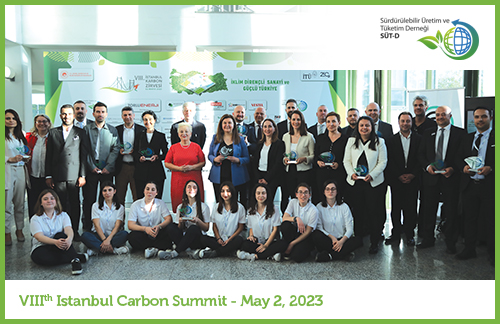
You inspire people around with your warm attitude and positive energy. Does being a traveler play a role in shaping your view of the world and philosophy of life?
In the ITU Department of Chemical Engineering Yearbook, it is written as “Filiz possesses a tremendous energy source that we cannot even understand where she gets it from. She may have discovered a new source of energy since she has been keen on chemistry from a young age. With her inexhaustible energy, she pays separate attention to every lesson and her notes are of great interest.” I put effort into energy technology, but could not discover a new energy source. I became a pioneer for biorefineries. I work on biofuels, biochemicals, biopower production, and biolubricants. I also keep writing with pleasure.
As a Rumelian girl raised in Üsküdar, Istanbul, my duties, explorations, cultural experiences and enjoyable travels, along with my son, husband, friends, students, and the flavor and aroma of coffee, keep my life energy high. I am aware that my energy has a positive effect on people. It is mentioned very often. How fortunate I am. Also being a traveler is important for my happiness management. I read. I travel. I read again. Seeing and exploring add energy to my academic life. The more I explore the planet, the more I exist among the beauties of nature, and witness what people contribute to their nature and culture, the more I work as a scientist and civil activist. I will continue working. During my last trip with my son to Manchester, also known as the critical city of the industrial revolution, I gained better understanding of what my country did not do, could not do and should have done in the past. Like our ITU, the symbol of Manchester is also the bee. We need to be as a worker bee. ITU also works as a bee for the welfare of our beautiful country.
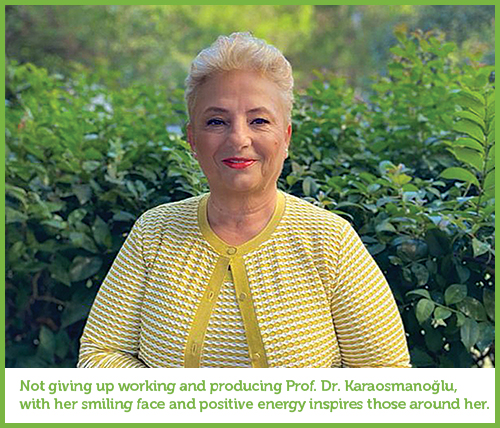
What is your message to the nation, the industry and young people of Türkiye who are building the future of their country in its 100th anniversary?
I am grateful to have the opportunity to witness these anniversaries. I want to give three messages. Manage the time wisely, because time is the only greatness that cannot be recycled. Work hard because without knowledge, there can be no ideas. Enhance the civil and professional competencies.
In sustainable living, let us progress by learning from our shortcomings and mistakes without saying “but” or “however”. In this way, peace and happiness will follow us. May our industry be prosperous and our youth fortunate. We proudly celebrate the 100th anniversary of our Turkish Republic.
